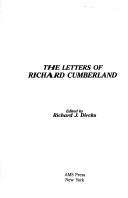AMS Studies in the Eighteenth-Century
1 primary work • 3 total works
Book 13
Richard Cumberland (1732-1811) is best remembered for "The West Indian" (1771) and "The Jew" (1794). He knew great persons in government and in literature, if not well, at least familiarly. The 224 letters collected here stretch from 1764 to 1811, and though many of them are neither literary nor theatrical, they may make informative reading. As a whole they may constitute a valuable source for historians of all sorts. There is information about Colonial administration, place-getting, and sale of posts, as well as about negotiations with dubious theatre managers and coping with recalcitrant or irresponsible actors. There has been no previous edition of Cumberland's letters. Dircks has collected MSS from 15 libraries, ranging from Harvard, Yale, and the British Library to the British Science Museum and the Sheffield City Library. To these he has added letters preserved only in four printed sources - eg Boaden and William Mudford's hostile account of Cumberland, published in 1812. The Garrick part of the correspondence is familiar, but most of the rest will not be, even to specialists.
Cumberland's many topical and personal allusions are clearly annotated, making this edition easy to use. Cumberland's hand presents few difficulties, and Dircks has adopted a straightforward old-spelling textual policy.
Cumberland's many topical and personal allusions are clearly annotated, making this edition easy to use. Cumberland's hand presents few difficulties, and Dircks has adopted a straightforward old-spelling textual policy.
Vol 17
This volume contains the comedies, "The Country Attorney" and "The School for Widows", variations on the theme of the ethics of inheritance. The two three-act comic operas that form a second set of plays demonstrate the power of the Lord Chamberlain's office in denying "Richard II" a license because of its treatment of the Peasant Revolt of 1381 and forcing the dramatic weakening of the play in the revision, "The Armorer". Also included here are the text of the musical drama, "The Widow of Delphi", and the tragedy, "The Arab".
In these memoirs, Cumberland recounts his career in drama, providing insights into the transitional period which witnessed the transformation from neo-classical literature to the Romantic movement. This fully annotated version contains a lengthy introduction and extensive explanatory notes.

